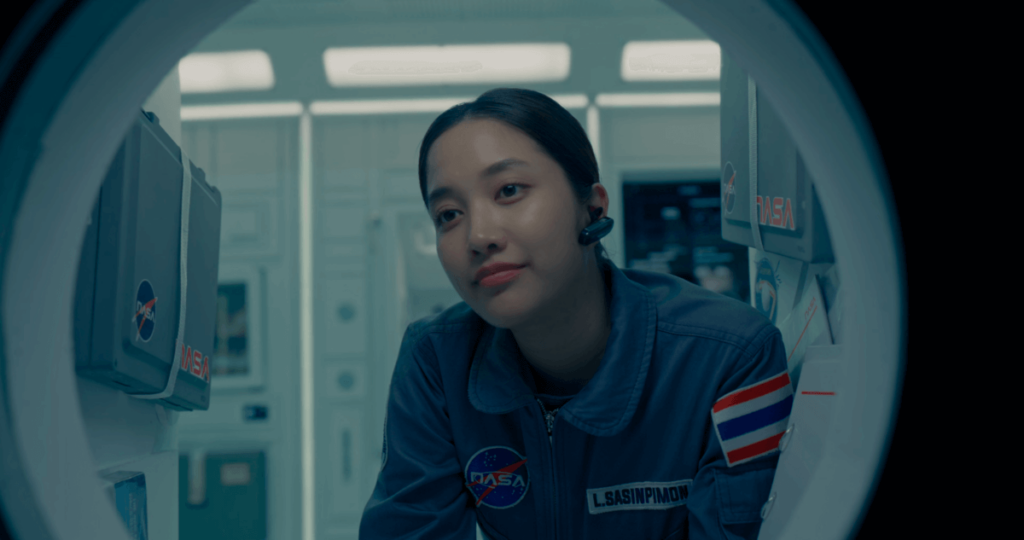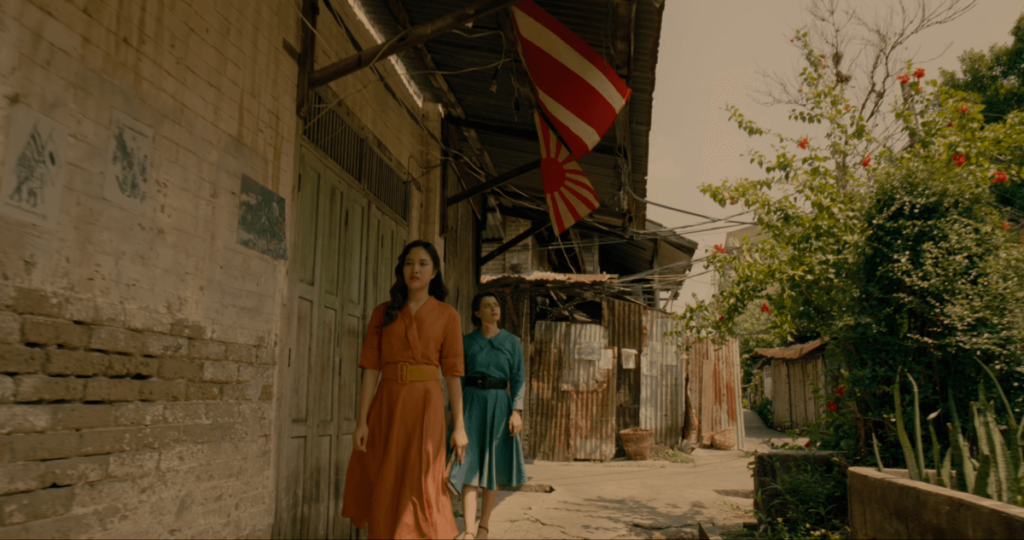On July 4, 2024, Uranus 2324 (2024), Asia’s first “Girl’s Love” space romance, had its premiere in Bangkok, Thailand. Truth be told, tears have streamed down my cheeks since the first scene. “It’s that good?” You ask. Well, wrong. But listen, I have a good reason.
In my lifetime, I never thought about the possibility of a $2 million Girl’s Love sci-fi film being produced in my homeland. The fact that Thailand’s screen industry allows this fantasy to come true struck me. Considering its capitalistic nature, investors always do everything to eliminate as much risk as possible. In other words, they need to know how the product will sell. This means there is a market for this Girl’s Love space romance film. “In Thailand?” you ask again. Thailand, and beyond. The film was made possible by the global fans of the two lead actresses, #FreenBeck, and, more precisely, their purchasing power.
The growing international “Sapphism” community celebrates love between women, drawing inspiration from the ancient Greek poet Sappho of Lesbos, who wrote about love for other women and is the origin of the word “lesbian.”
This sapphic economy presents an alternative model for female empowerment, exemplified by Thailand’s emerging “Girl’s Love” wave. Girl’s Love combines elements of the Japanese “Yuri” manga subculture with K-idol business models, creating a genre featuring all-female protagonists. This trend is gaining popularity in Thailand and beyond, challenging the long-standing dominance of Boy’s Love (BL) content. BL, which originated from Japan’s “Yaoi” manga subculture and Korea’s idol business model, often portrays idealized same-sex male romances that many queer individuals find unrealistic. This is because Yaoi manga was originally created by and for women, offering an escape from patriarchal realities rather than authentic queer representation.
In Thailand, a unique subculture has emerged known as “Y Girl.” The “Y” in this context has a dual meaning. It represents girls who are fans of “Yaoi” and BL content (boy-boy relationships); at the same time, it also stands for “Yuri,” the girl-girl counterpart to BL, reflecting the growing interest in sapphic content. This “Y Girl” phenomenon illustrates the fluid and inclusive nature of fandom in Thailand, where audiences appreciate both male-male and female-female relationship narratives in media. The rise of Girl’s Love content alongside the established BL genre demonstrates a diversification of storytelling and representation in Thai popular culture, catering to a wide range of preferences and identities.

#FreenBecky refers to Thai actresses Sarocha ‘Freen’ Chankimha and Rebecca ‘Becky’ Patricia Armstrong, who frequently portray couples in various works. Their 2022 debut, “Gap: The Series,” Garnered over 756.6 million YouTube views. catapulting them to stardom.

As of July 2024, both artists command impressive social media influence, each boasting over 4 million Instagram followers. Their fanbase, while primarily Thai, extends across Asia and into the West, with significant followings in the Philippines, Vietnam, Singapore, China, Japan, South Korea, and the US. Building on this success, #FreenBecky embarked on a series of fan meetings across Asia, with US events planned. Their on-screen chemistry has earned them several domestic entertainment awards, including accolades from the Nine Entertain Awards and KAZZ Awards 2023-2024. Their rising profile led to invitations to the 2024 Cannes Film Festival and Saudi Arabia’s Red Sea International Film Festival’s “Women in Cinema” event. Their Cannes debut proved remarkably lucrative: according to Lefty.io and Vogue Business, Rebecca generated $4.7 million in earned media value (EMV) for Balenciaga (75% of the brand’s total EMV) and Chopard, while Freen produced $4.7 million for Ferragamo, Chopard, and Burburry combined. This growing fame has paved the way for more ambitious projects, such as their starring roles in “Uranus 2324.”

“Uranus 2324” is a collaborative project between Thai companies VelCurve Studio, GM Generates, and C EYE (Public Company). It’s one of four films awarded a 2024 government grant to support the Thai Soft Power Policy. Directed by Thanadol Nualsuth and written by Thitipong Chaisati and Nut Nualpang, with Keetawat Chinnakote as executive producer, the film narrates the multiverse love tragedy of “Lin” and “Kath” as they overcome various challenges to reunite across different realms—on the ground, underwater, in space, and in parallel universes.


As a fellow filmmaker, I want to congratulate the team for realizing this ambitious project. It’s surely not easy to get done. Kudos to the filmmakers, actors, crews, including Spaceth.co (the space production advisor), studios, and investors for making it through. You’re advancing the history of the Thai film industry to another level. Tears streamed down my cheeks at the opening, which showed promising quality production and delivery I never expected to see in a Thai queer film. I admire this film for contributing to the representation of Thai women and allowing young Thai girls to extend their horizons and imagination. One day, they might become astrophysicists, astronauts, or freedivers! This image will surely inspire the next generation of young girls who have a chance to watch it.
As it markets itself as a romance, I didn’t expect the film to be complicated or philosophical. The story is an inter-spacetime struggle to be with your soulmate. The first half is fine. Freen and Becky have great chemistry, which explains their rapid rise to success. As someone who has never watched their show before, I enjoyed seeing them together and genuinely wish more cinematic projects came their way in the future.
However, as the narrative progresses from the middle toward the end, the film ambitiously explores complex themes but struggles to deliver them succinctly. A solar storm burst muddles the parallel universes, with spacetimes intertwining; the past, present, and future seem to happen all at once, and their struggle to be together intensifies to a supernatural level. This setting is supposed to provoke our thoughts on philosophical questions about soulmates and life. But the film seems to get lost in the universe and never comes back. The parallel stories lack integration to create a sublime climax. The backbone of the narrative—genuine emotion—sadly isn’t evoked.

Despite its potential to leverage Freen Beck’s global fanbase and the growing interest in queer narratives, the film doesn’t reach beyond surface-level appeal. The excessive cuddling scenes without meaning diluted the narrative. This magic fails to spellbind non-fans.
Let’s talk about patriotism. With a healthy dose, I believe it is good. We are living in a globalized world, continuously interacting, cooperating, and doing commerce (oftentimes conflicting) with each other. It’s smart to know what capital we have and how to present it to the international community.
This film, with partial support from Thailand’s Ministry of Culture, features Thailand (or, to be specific, a Thai enterprise) as a strategic partner with NASA in the Lunar Gateway mission; it supplies space-grade food for space missions. Great. Unfortunately, the execution resulted in what feels more like a product showroom for the Thai nation and the Thai enterprise.

The cohesive narrative should be valued as the top priority. As this project is meant to be watched on the big screen, brands should understand that over-featuring products can be counterproductive and affect brand reputation negatively. The cinematic experience is different from watching on smaller screens, and subtlety in product placement often creates a better psychological effect.
Please don’t get me wrong. I am not writing this to attack anyone. I understand that these capitalistic fulfillments—seeking funding and sponsorship—are fundamental for project finance. However, if disproportionate, it dilutes the narrative and steals the magic the cinema should possess.
Patriotism oozes throughout the storyline, from the future to the past, which features a speculative situation where the Axis won World War II. When the protagonists, who are “Free Thai Movement” members (sided with the Allies), face challenges as they overhear their fellow citizens’ doubts about the future of Thailand (freshly renamed from Siam) as the Japanese were overpowering the country, one of the protagonists bursts out, “Regardless of spacetime, Thailand has never been colonized!” “Eeeeeeeeeeeeeeeeeeeeeeek!” I internally screamed, not knowing how to properly react. I think the line is fine, but the execution is so blunt. Thoughts bubble up as I think of Thailand’s perspective within the framework of post-colonialism and its pride in the title of being “a country that was never colonized.” Anyway, I continued with the film through the end and witnessed it struggle through the messy last act before it finally landed.

Overall, I am impressed by the way the filmmakers try to weave these narratives together. The “2324” in the title “Uranus 2324” actually refers to the Buddhist calendar year when Uranus was classified as a planet (1781). The fact that Thailand is the only country using the Buddhist Era as an official calendar makes me realize that we are 543 years apart. In this film, Uranus serves as an analogy for the protagonists’ star-crossed romance. Uranus is significant because it is billions of miles away from Earth. It represents a fantasy, something unattainable, an object of desire. If we are Earth, each of us has our very own Uranus. It is the destination the film urges us to strive for, no matter how impossible it seems. I think this concept resonates with the story. However, I believe more cinematic devices should be employed in execution to give flesh and blood to the narrative.

Despite its challenges, Uranus 2324 has achieved a significant milestone by securing distribution rights in 27 countries across various regions. This international reach demonstrates the growing global interest in queer narratives and Thai content. As the film enters a month of domestic screening, it has grossed $241K against its $2M budget. While these initial figures may seem modest, the true test lies in its international performance. I sincerely hope this film succeeds, not just for its own sake, but because it represents a crucial step forward. The realization of a queer sci-fi film at this scale is a landmark event, and its success could pave the way for more diverse and ambitious projects in the future. Let’s wait and see if Uranus 2324 can captivate audiences worldwide and prove that there’s a viable market for the next project.

#FreenBecky fans, ultimately, what the investors care about is your purchasing power. So, I’m urging you to demand more. The ambition for this high-concept sci-fi is there, but the execution is not. Don’t just settle for projects that feature your idols as product ambassadors. Instead, demand films that could see #FreenBecky walking the red carpet at the Cannes Film Festival—not just as celebrities but as actresses of films in competition. You have the power to shape the future of Sapphic cinema and push it to new heights of artistic achievement.
“Who runs the world?”—“Girls!”—And the power is in your hands.
This essay is a part of the “Mek◊ng Sci-Fi” series by Vorakorn “Billy” Ruetaivanichkul. It is published in English billyvorr.com and Thai TheMissionTH.co and was completed as part of the 2024 ArtsEquator Fellowship. The views expressed are solely those of the author. Connect with him on Facebook, IG, X, or Discord.
